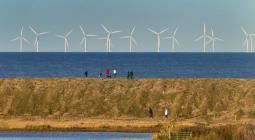Starmer: Labour plan for state-backed offshore windfarms a ‘gamechanger’
Plan follows slashing of £28bn green pledge, which Ed Miliband denies having considered resigning over
Labour’s plan for state-backed offshore windfarms will be a “gamechanger”, Keir Starmer has said, as the party seeks to regain the initiative on green policy after the slow-motion ditching of its £28bn investment pledge.
Speaking to broadcasters after a visit to Holyhead port in north Wales alongside Vaughan Gething, the country’s new first minister, Starmer insisted that a transition to sustainable power was still “one of my central missions”.
In a separate interview the shadow climate change secretary, Ed Miliband, who also took part in the visit, insisted that he backed the climbdown from the longstanding plan and vehemently denied that he had considered resigning.
The visit to Holyhead, which also involved Jo Stevens, the shadow Wales secretary, was to promote a remaining element of the scaled-back green plan, GB Energy, a publicly owned sustainable energy company.
Part of this would involve floating offshore windfarms, which Starmer said would not just make energy more sustainable but would also bring down bills.
“Floating offshore wind is going to be a gamechanger when it comes to energy,” he told BBC Wales. “Some country in the world is going to be the leader, and I want that to be the UK. What we can do is have the Westminster government, and the Labour government here in Wales, working on the next generation of energy.”
Speaking to ITV Wales, Starmer said last month’s decision to slash the pledge to invest £28bn a year in green policies to under £15bn still left “a huge difference” with government policy over renewables.
Interviewed by BBC Radio 4’s World at One, Miliband, who has been largely quiet since the change of policy, said there were “huge opportunities” for jobs from renewable energy, and that the floating windfarm plan was a major policy.
“It’s going to be the first priority of GB Energy’s £5bn investment,” he said. “It will partner with the private sector in places like north Wales so that we can get the jobs that floating wind can bring and, indeed, the lower energy bills.”
Dismissing a report from the Policy Exchange thinktank that said Labour’s plan to decarbonise the electricity system by 2030 was unrealistic, Miliband denied that he was disappointed in the lower investment.
“I don’t see it that way,” he said. “I see it as a situation where we know the fiscal inheritance is going to be incredibly difficult for an incoming Labour government. We’ve got to promise what we can deliver, and it has got to be built on proper fiscal foundations. That’s why we made the decision that we did.
“What any government must do, and this is the lesson of Liz Truss’s disaster, is have fiscal stability. I’m not going to give a running commentary on the discussion we had, but I support the decision that was made.”
Asked if he had considered resigning over the ditching of the £28bn target, Miliband replied: “Absolutely not. Not for a moment.”
Cover photo: Keir Starmer visits the Port of Holyhead with shadow Welsh secretary Jo Stevens, new Welsh first minister Vaughan Gething and shadow energy secretary Ed Miliband. Photograph: Peter Byrne/PA





